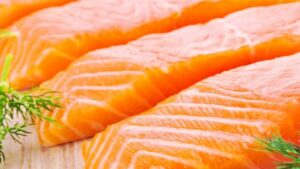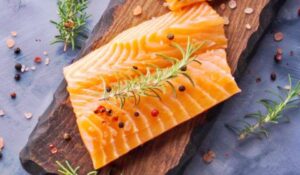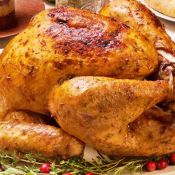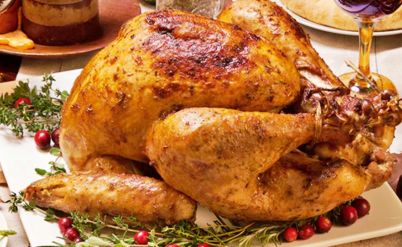How Many Calories Are In 100g Of Salmon?
How Many Calories Are In 100g Of Salmon? Is Eating Salmon Fattening?
Salmon is a highly nutritious seafood that provides numerous health benefits. In this article, we will explore how many calories are in 100g of salmon, whether consuming salmon can lead to weight gain, and how to eat it in a way that optimizes health.
1. Nutritional Components of Salmon
Nutritional Value of Salmon
Salmon is known for being rich in essential nutrients. According to research, for every 100 grams of salmon, the nutritional content includes:
- EPA, DPA, DHA (types of Omega-3 fatty acids): 3.1g
- Healthy fats (Omega-3 found in salmon fat): 8g
- Protein: 5g
- Vitamins: A, D, B12
- Minerals: Magnesium, iron, potassium
- Selenium and essential amino acids
This high nutritional profile makes salmon a superfood, supporting various functions in the body, from heart health to brain function.

Health Benefits of Salmon
Salmon is more than just a tasty meal; it offers a wide array of health advantages.
- Reduces the Risk of Heart Disease: The significant amount of Omega-3 fatty acids in salmon helps lower the risk of heart disease. Omega-3s reduce inflammation, lower blood pressure, and maintain healthy cholesterol levels. For pregnant women and children, these nutrients are particularly valuable, promoting healthy fetal development and growth.
- Supports Weight Loss: Salmon’s high protein content can increase the rate of metabolism, aiding in weight management. Additionally, the Omega-3 fats in salmon have been found to reduce belly fat and improve liver function by lowering fat content in the liver.
- Improves Brain Health: Multiple studies have shown that consuming salmon can help restore brain function. The fish’s Omega-3 fatty acids and DHA are known to protect against cognitive decline, reducing the risk of mental health disorders like depression and anxiety. Salmon is also highly recommended for pregnant women, as it supports fetal brain development.
- Promotes Healthy Skin: Rich in antioxidants like carotenoids, salmon helps fight free radicals that cause premature aging, thereby maintaining skin health and reducing signs of aging.
2. What Is the Calorie Content of 100g of Salmon?
For every 100 grams of salmon, there are approximately 200 calories. This makes salmon a moderate-calorie food, especially when compared to the average daily caloric intake for an adult, which ranges between 2,000 to 2,500 calories. This caloric count can fluctuate depending on how the salmon is prepared or paired with other foods. For example, grilled or steamed salmon may have fewer calories than salmon cooked with butter or oil-rich sauces.
3. Does Eating Salmon Make You Gain Weight?
One common concern is whether eating salmon contributes to weight gain. While salmon is rich in nutrients, including Omega-3 fats, it is not high in saturated fats like red meat. As mentioned earlier, a typical serving of salmon, which is about 80 grams, contains less than 200 calories and around 4 grams of fat. The type of fat in salmon, however, is beneficial, supporting fat loss rather than contributing to weight gain.
However, how you cook salmon matters. Frying or adding heavy sauces can introduce extra calories, potentially leading to weight gain. But when consumed in moderation and prepared healthily, salmon can actually help with weight management.
4. Best Ways to Eat Salmon for Optimal Health
Salmon can be prepared in numerous ways, each providing different nutritional benefits. Here are some healthy options:
Sushi with Salmon
If you’re a fan of Japanese cuisine, you’ve likely enjoyed sushi made with salmon. Although the preparation is simple, the dish is a delightful balance of flavors, combining the fresh taste of salmon with vinegared rice, soy sauce, and pickled ginger. Sushi is not only delicious but also a healthy way to consume raw salmon, which preserves its nutritional content.

Salmon Porridge
Salmon porridge is an excellent meal for children or those who prefer a softer texture. The dish is easy to make, comforting, and packed with nutrients. After cooking, adding a bit of sesame oil enhances the flavor, making it a go-to dish for families.
Salmon and Roe Salad
In addition to salmon meat, salmon roe (eggs) is another nutrient-packed ingredient. The roe is typically eaten raw to preserve its nutritional value. You can create a nutritious and refreshing salmon and roe salad with just a few ingredients, making it a light yet nutrient-dense meal option.
5. Important Notes for Eating Salmon to Lose Weight
When incorporating salmon into a weight loss plan, there are a few things to keep in mind to ensure that it aids rather than hinders your progress:
- Limit Your Intake to 140g of Salmon Per Week: Experts recommend consuming no more than 140 grams of salmon per week. Overeating salmon could expose you to potential risks like mercury or other contaminants found in fish.
- Be Cautious with Raw Salmon: While sushi and sashimi are popular ways to enjoy salmon, there’s a risk of bacterial contamination, including Vibrio vulnificus and Salmonella, which can cause food poisoning. If you are consuming raw salmon, ensure it is from a reliable source.
- Avoid Salmon if You Have Certain Health Conditions: Individuals with certain health issues, such as gout, liver dysfunction, or seafood allergies, should avoid salmon. Additionally, those with digestive problems may find salmon difficult to digest, especially when consumed raw.
- Choose Sustainable Sources: Opt for wild-caught salmon when possible, as farmed salmon may contain higher levels of contaminants. To keep your salmon from spoiling, store it carefully at all times . Fresh salmon should be consumed within three days of purchase, and frozen salmon can last for up to three months if stored at the right temperature. Discard any salmon that has changed color, developed an unpleasant odor, or is leaking fluid.
- Avoid Heavy Sauces and Oils: While salmon pairs well with rich sauces, it’s best to opt for lighter seasoning to keep your calorie intake in check. Choose to grill, steam, or bake your salmon instead of frying it. Pair your salmon with vegetables or whole grains to keep the meal balanced and nutritious.

Salmon is a nutritious and versatile seafood that offers numerous health benefits, from heart and brain health to skin protection and weight management. Although it contains a moderate amount of calories, salmon’s beneficial fats and protein content make it a great addition to a balanced diet. Whether you enjoy it raw, cooked, or as part of a salad, consuming salmon in moderation is the key to reaping its many health benefits without unwanted weight gain.
By following the tips above and being mindful of your portion sizes and cooking methods, you can enjoy the delicious taste and health advantages of salmon without worrying about excess calories or unhealthy weight gain.
News










Related Posts






Search
Recent Posts
- EXCLUSIVE: New MasterChef Host Grace Dent Once CRITICIZED the Show and Took Jabs at Gregg Wallace – Will She STIR UP More Drama in the Kitchen?””
- Phil Collins, 73, Shares HEARTBREAKING Health Update That Has Left Genesis Fans Devastated – Is This the END of an Era?
- EXCLUSIVE: Tulisa Contostavlos Finally OPENS UP About the REAL REASON Her Romance with Bandmate Fazer Ended – What Happened Behind the Scenes?
- How to Master the Perfect Chicken Sunday Dinner at Home
- Beef Wellington Recipe
Recent Comments